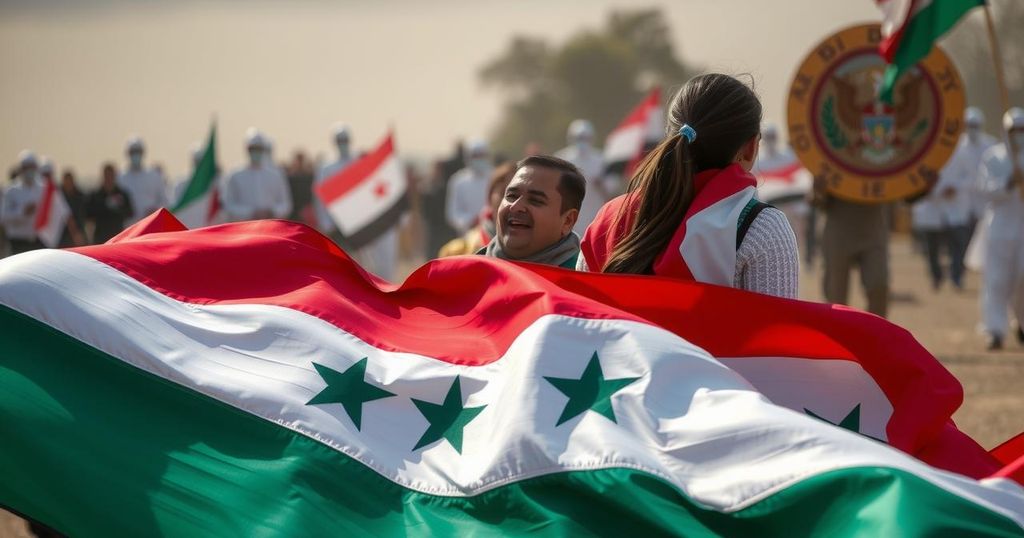Syria’s liberation from Assad has led to a surge of emotional expression among its citizens, underscoring the public’s joy alongside their grief for lost loved ones. Ahmed al-Sharaa of Hayat Tahrir al-Sham promotes an inclusive governance approach, while the country faces external threats from Turkey and Western powers. A transitional government has been established, yet the path forward requires concerted efforts for inclusivity and navigating foreign challenges.
The recent liberation of Syria, while anticipated, has unfolded unexpectedly as a moment of emotional complexity for the Syrian populace. Since the downfall of Bashar al-Assad’s regime, millions have taken to the streets to express their jubilation and share their stories, with a notable resurgence of women’s involvement in public life. As families reunite, they are simultaneously grappling with the painful reality of the loss of loved ones in state custody. The heartbreaking estimate suggests that a significant majority of the 130,000 missing individuals from Assad’s prisons are deceased, with numerous mass graves being uncovered across the country.
In this transformative period, the stability of the liberated regions is largely attributed to the leadership of Hayat Tahrir al-Sham (HTS) and its commander Ahmed al-Sharaa, who is determined to foster an atmosphere of inclusion and moderation. Contrary to fears of authoritarianism, Sharaa has demonstrated a willingness to engage with Syria’s diverse demographic, understanding that successful governance requires a collaborative approach and respect for varying societal norms. His administration aims to reassure all ethnic and sectarian groups, including Alawites and secularists, that their rights will be upheld, and women’s freedoms will be respected.
Sharaa’s leadership has ushered in a transitional government, with Mohammad al-Bashir appointed as Prime Minister until March 2025, bolstering the expectation for a structured and efficient administration. However, the process of forming a new constitution necessitates enthusiasm for inclusivity, ensuring the participation of all key communities to build trust and unity within this nascent political framework. Although the opposition coalition presents illustrious candidates for participation, its effectiveness remains hampered by a lack of relevant governance experience and excessive ties to foreign powers, particularly Turkey.
Despite domestic hopefuls, external threats loom large. While Syria has freed itself from the influences of Russia and Iran, new challenges emerge from Turkey, the Syrian Democratic Forces (SDF), and other foreign powers vying for influence. The SDF’s recent measures to avert conflict with Turkey reflect ongoing tensions, while assurances from Sharaa regarding the political and social rights of the Kurdish population signal a commitment to addressing these complexities.
Furthermore, the imposition of sanctions by Western powers post-liberation signals a hostile reception to Syria’s newfound independence. The continuing military actions by Israel further complicate already tense circumstances, jeopardizing the country’s security. Despite these challenges, the Syrian populace remains resilient and determined to reclaim their agency. As historical restraints diminish, Syria’s future converges on the belief that its people will guide its path.
The article explores the transformations occurring in Syria following the fall of the Assad regime. It addresses the emotional responses, the sociopolitical dynamics influenced by new leadership, and the necessity for inclusive governance involving various sects and communities. The article also highlights ongoing challenges from both domestic and foreign entities that threaten the newly gained freedom, while emphasizing the significance of Syrian resilience in shaping the nation’s future.
In summary, Syria’s liberation has ushered in a complex era marked by optimism and challenges. The leadership of Hayat Tahrir al-Sham, particularly Ahmed al-Sharaa, signifies a move towards inclusivity and moderation, yet significant hurdles remain, notably from external powers and historical grievances within the population. For Syria to thrive, the emphasis on unity, representation, and addressing foreign aggressions will be crucial in determining the stability and sovereignty of its future.
Original Source: www.theguardian.com






